GSK: Organisational Behaviour, Leadership Styles and Motivation
VerifiedAdded on 2023/04/05
|16
|4137
|139
Report
AI Summary
This report provides a comprehensive analysis of organisational behaviour within GlaxoSmithKline (GSK), a major healthcare company. It begins by comparing and contrasting different types of organizational structures and cultures, examining how these elements impact GSK's performance. The report explores how individual employee behavior is influenced by various factors, including personal, demographic, psychological, and environmental aspects. It then compares different leadership styles, assessing their effectiveness in the context of GSK and its competitors, and explores how organizational theory supports and explains management practices at GSK, contrasting these approaches with those used in other organizations. Furthermore, the report investigates the impact of different leadership styles on employee motivation within GSK, comparing motivational theories and their usefulness in the organizational setting. Finally, it examines the nature of groups and group behavior at GSK, identifying factors that promote teamwork and assessing the impact of technology on team functioning. The report concludes by summarizing the key findings and their implications for GSK's organizational effectiveness. Desklib provides students with access to similar solved assignments and study resources.
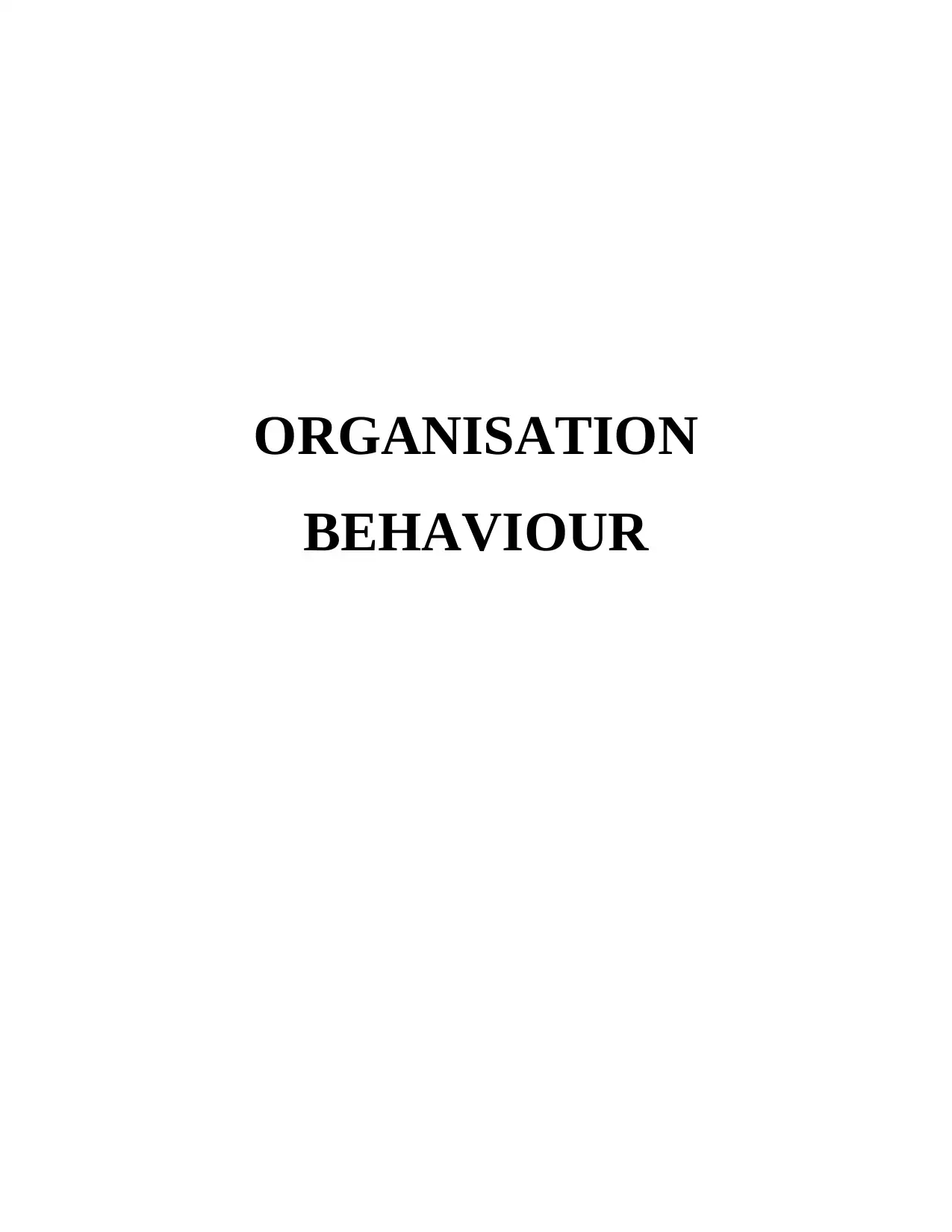
ORGANISATION
BEHAVIOUR
BEHAVIOUR
Paraphrase This Document
Need a fresh take? Get an instant paraphrase of this document with our AI Paraphraser
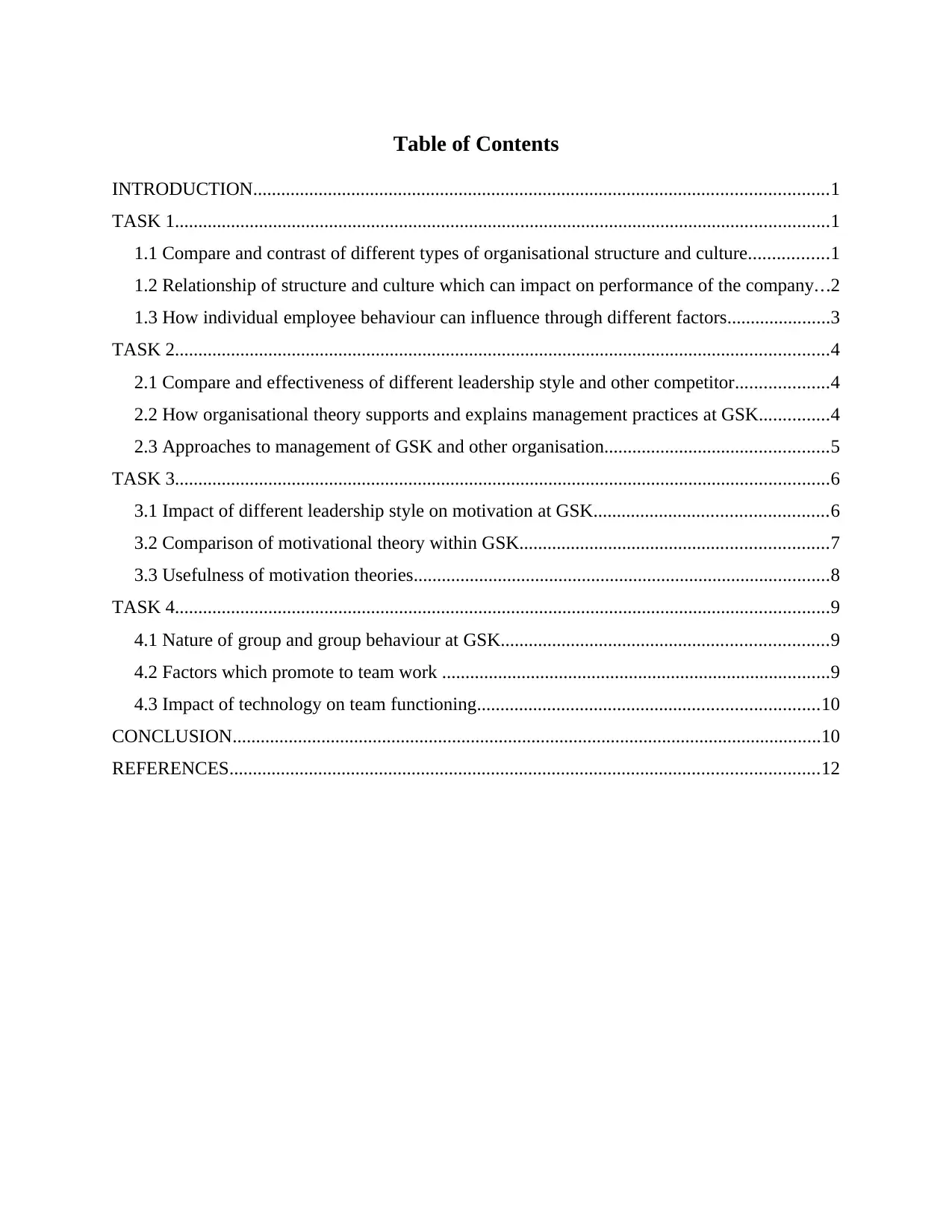
Table of Contents
INTRODUCTION...........................................................................................................................1
TASK 1............................................................................................................................................1
1.1 Compare and contrast of different types of organisational structure and culture.................1
1.2 Relationship of structure and culture which can impact on performance of the company...2
1.3 How individual employee behaviour can influence through different factors......................3
TASK 2............................................................................................................................................4
2.1 Compare and effectiveness of different leadership style and other competitor....................4
2.2 How organisational theory supports and explains management practices at GSK...............4
2.3 Approaches to management of GSK and other organisation................................................5
TASK 3............................................................................................................................................6
3.1 Impact of different leadership style on motivation at GSK..................................................6
3.2 Comparison of motivational theory within GSK..................................................................7
3.3 Usefulness of motivation theories.........................................................................................8
TASK 4............................................................................................................................................9
4.1 Nature of group and group behaviour at GSK......................................................................9
4.2 Factors which promote to team work ...................................................................................9
4.3 Impact of technology on team functioning.........................................................................10
CONCLUSION..............................................................................................................................10
REFERENCES..............................................................................................................................12
INTRODUCTION...........................................................................................................................1
TASK 1............................................................................................................................................1
1.1 Compare and contrast of different types of organisational structure and culture.................1
1.2 Relationship of structure and culture which can impact on performance of the company...2
1.3 How individual employee behaviour can influence through different factors......................3
TASK 2............................................................................................................................................4
2.1 Compare and effectiveness of different leadership style and other competitor....................4
2.2 How organisational theory supports and explains management practices at GSK...............4
2.3 Approaches to management of GSK and other organisation................................................5
TASK 3............................................................................................................................................6
3.1 Impact of different leadership style on motivation at GSK..................................................6
3.2 Comparison of motivational theory within GSK..................................................................7
3.3 Usefulness of motivation theories.........................................................................................8
TASK 4............................................................................................................................................9
4.1 Nature of group and group behaviour at GSK......................................................................9
4.2 Factors which promote to team work ...................................................................................9
4.3 Impact of technology on team functioning.........................................................................10
CONCLUSION..............................................................................................................................10
REFERENCES..............................................................................................................................12

⊘ This is a preview!⊘
Do you want full access?
Subscribe today to unlock all pages.

Trusted by 1+ million students worldwide
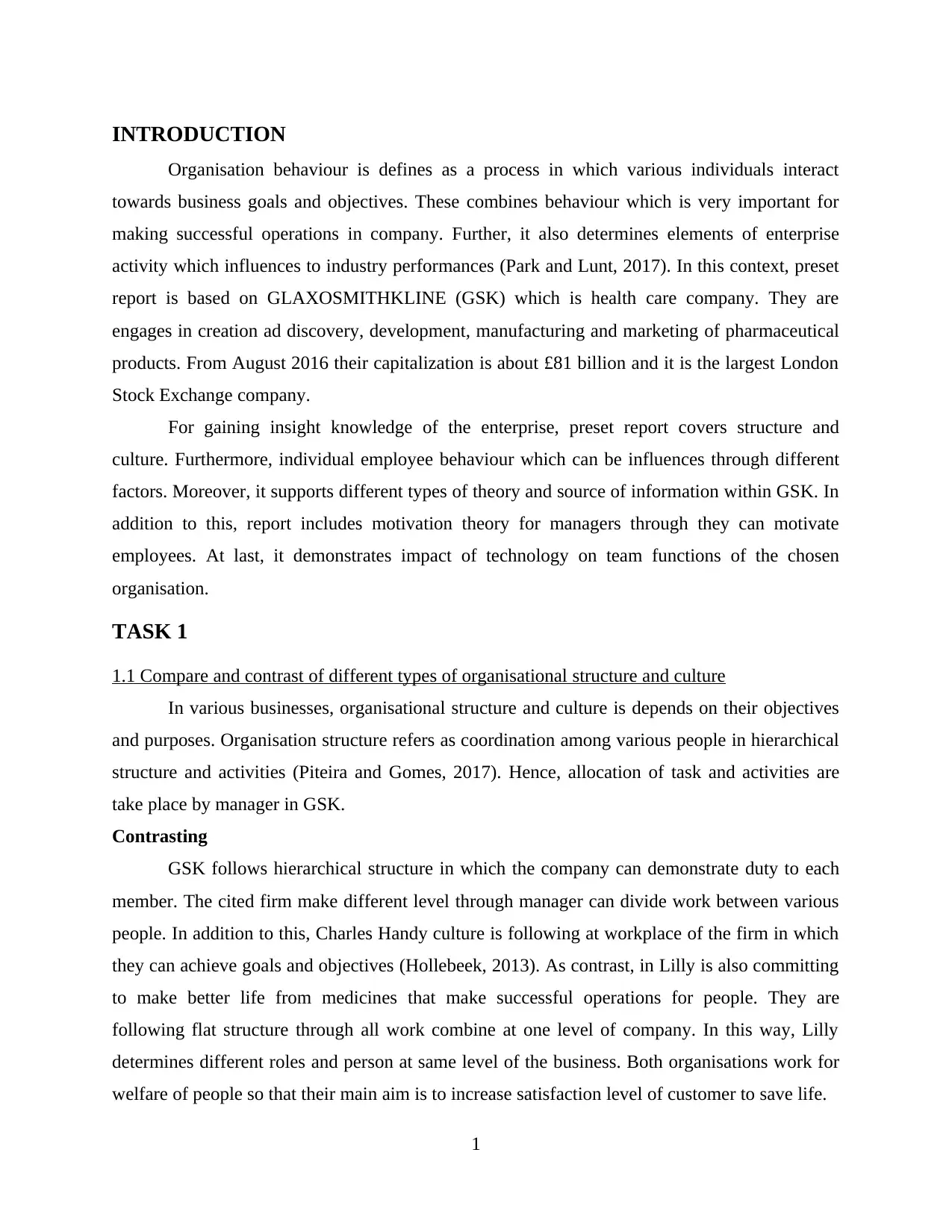
INTRODUCTION
Organisation behaviour is defines as a process in which various individuals interact
towards business goals and objectives. These combines behaviour which is very important for
making successful operations in company. Further, it also determines elements of enterprise
activity which influences to industry performances (Park and Lunt, 2017). In this context, preset
report is based on GLAXOSMITHKLINE (GSK) which is health care company. They are
engages in creation ad discovery, development, manufacturing and marketing of pharmaceutical
products. From August 2016 their capitalization is about £81 billion and it is the largest London
Stock Exchange company.
For gaining insight knowledge of the enterprise, preset report covers structure and
culture. Furthermore, individual employee behaviour which can be influences through different
factors. Moreover, it supports different types of theory and source of information within GSK. In
addition to this, report includes motivation theory for managers through they can motivate
employees. At last, it demonstrates impact of technology on team functions of the chosen
organisation.
TASK 1
1.1 Compare and contrast of different types of organisational structure and culture
In various businesses, organisational structure and culture is depends on their objectives
and purposes. Organisation structure refers as coordination among various people in hierarchical
structure and activities (Piteira and Gomes, 2017). Hence, allocation of task and activities are
take place by manager in GSK.
Contrasting
GSK follows hierarchical structure in which the company can demonstrate duty to each
member. The cited firm make different level through manager can divide work between various
people. In addition to this, Charles Handy culture is following at workplace of the firm in which
they can achieve goals and objectives (Hollebeek, 2013). As contrast, in Lilly is also committing
to make better life from medicines that make successful operations for people. They are
following flat structure through all work combine at one level of company. In this way, Lilly
determines different roles and person at same level of the business. Both organisations work for
welfare of people so that their main aim is to increase satisfaction level of customer to save life.
1
Organisation behaviour is defines as a process in which various individuals interact
towards business goals and objectives. These combines behaviour which is very important for
making successful operations in company. Further, it also determines elements of enterprise
activity which influences to industry performances (Park and Lunt, 2017). In this context, preset
report is based on GLAXOSMITHKLINE (GSK) which is health care company. They are
engages in creation ad discovery, development, manufacturing and marketing of pharmaceutical
products. From August 2016 their capitalization is about £81 billion and it is the largest London
Stock Exchange company.
For gaining insight knowledge of the enterprise, preset report covers structure and
culture. Furthermore, individual employee behaviour which can be influences through different
factors. Moreover, it supports different types of theory and source of information within GSK. In
addition to this, report includes motivation theory for managers through they can motivate
employees. At last, it demonstrates impact of technology on team functions of the chosen
organisation.
TASK 1
1.1 Compare and contrast of different types of organisational structure and culture
In various businesses, organisational structure and culture is depends on their objectives
and purposes. Organisation structure refers as coordination among various people in hierarchical
structure and activities (Piteira and Gomes, 2017). Hence, allocation of task and activities are
take place by manager in GSK.
Contrasting
GSK follows hierarchical structure in which the company can demonstrate duty to each
member. The cited firm make different level through manager can divide work between various
people. In addition to this, Charles Handy culture is following at workplace of the firm in which
they can achieve goals and objectives (Hollebeek, 2013). As contrast, in Lilly is also committing
to make better life from medicines that make successful operations for people. They are
following flat structure through all work combine at one level of company. In this way, Lilly
determines different roles and person at same level of the business. Both organisations work for
welfare of people so that their main aim is to increase satisfaction level of customer to save life.
1
Paraphrase This Document
Need a fresh take? Get an instant paraphrase of this document with our AI Paraphraser
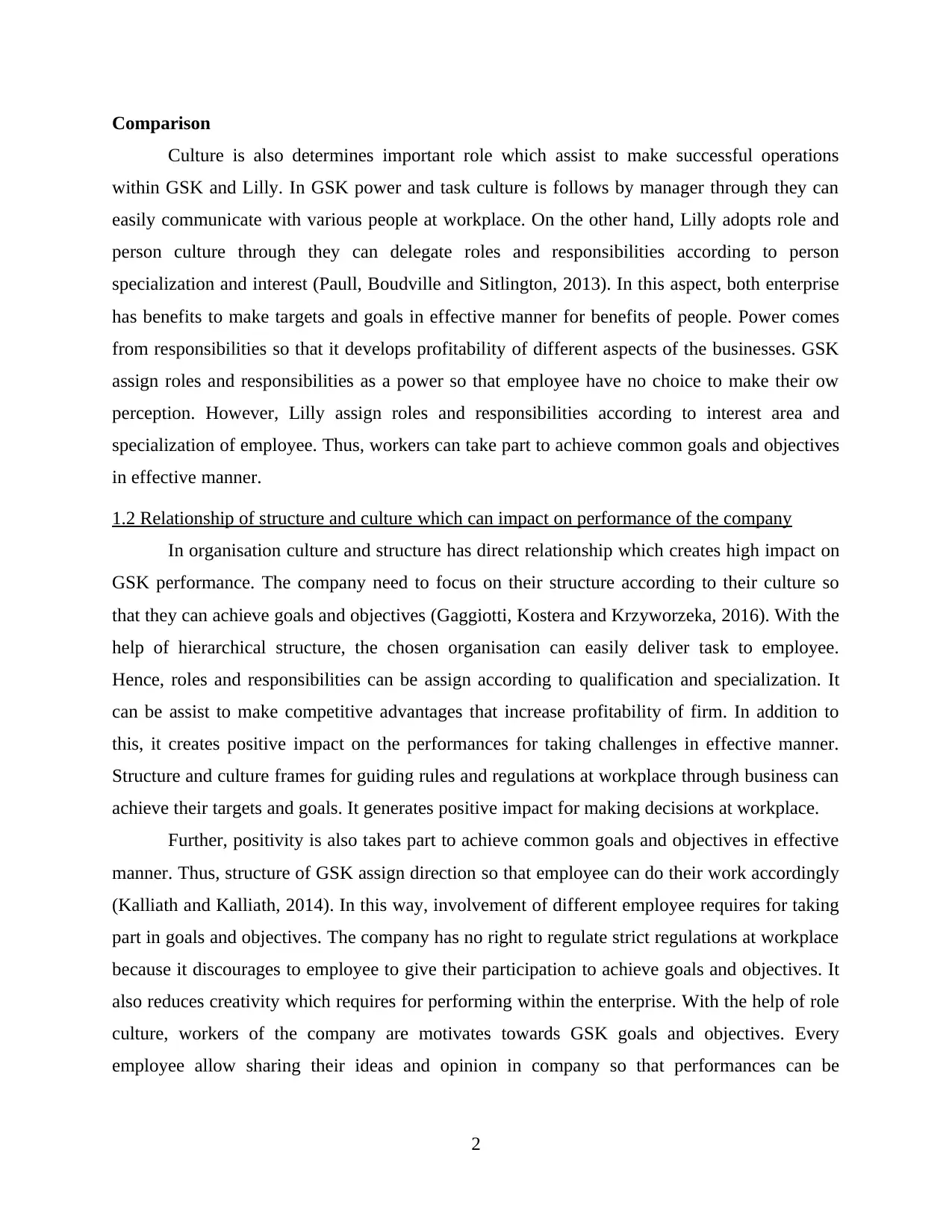
Comparison
Culture is also determines important role which assist to make successful operations
within GSK and Lilly. In GSK power and task culture is follows by manager through they can
easily communicate with various people at workplace. On the other hand, Lilly adopts role and
person culture through they can delegate roles and responsibilities according to person
specialization and interest (Paull, Boudville and Sitlington, 2013). In this aspect, both enterprise
has benefits to make targets and goals in effective manner for benefits of people. Power comes
from responsibilities so that it develops profitability of different aspects of the businesses. GSK
assign roles and responsibilities as a power so that employee have no choice to make their ow
perception. However, Lilly assign roles and responsibilities according to interest area and
specialization of employee. Thus, workers can take part to achieve common goals and objectives
in effective manner.
1.2 Relationship of structure and culture which can impact on performance of the company
In organisation culture and structure has direct relationship which creates high impact on
GSK performance. The company need to focus on their structure according to their culture so
that they can achieve goals and objectives (Gaggiotti, Kostera and Krzyworzeka, 2016). With the
help of hierarchical structure, the chosen organisation can easily deliver task to employee.
Hence, roles and responsibilities can be assign according to qualification and specialization. It
can be assist to make competitive advantages that increase profitability of firm. In addition to
this, it creates positive impact on the performances for taking challenges in effective manner.
Structure and culture frames for guiding rules and regulations at workplace through business can
achieve their targets and goals. It generates positive impact for making decisions at workplace.
Further, positivity is also takes part to achieve common goals and objectives in effective
manner. Thus, structure of GSK assign direction so that employee can do their work accordingly
(Kalliath and Kalliath, 2014). In this way, involvement of different employee requires for taking
part in goals and objectives. The company has no right to regulate strict regulations at workplace
because it discourages to employee to give their participation to achieve goals and objectives. It
also reduces creativity which requires for performing within the enterprise. With the help of role
culture, workers of the company are motivates towards GSK goals and objectives. Every
employee allow sharing their ideas and opinion in company so that performances can be
2
Culture is also determines important role which assist to make successful operations
within GSK and Lilly. In GSK power and task culture is follows by manager through they can
easily communicate with various people at workplace. On the other hand, Lilly adopts role and
person culture through they can delegate roles and responsibilities according to person
specialization and interest (Paull, Boudville and Sitlington, 2013). In this aspect, both enterprise
has benefits to make targets and goals in effective manner for benefits of people. Power comes
from responsibilities so that it develops profitability of different aspects of the businesses. GSK
assign roles and responsibilities as a power so that employee have no choice to make their ow
perception. However, Lilly assign roles and responsibilities according to interest area and
specialization of employee. Thus, workers can take part to achieve common goals and objectives
in effective manner.
1.2 Relationship of structure and culture which can impact on performance of the company
In organisation culture and structure has direct relationship which creates high impact on
GSK performance. The company need to focus on their structure according to their culture so
that they can achieve goals and objectives (Gaggiotti, Kostera and Krzyworzeka, 2016). With the
help of hierarchical structure, the chosen organisation can easily deliver task to employee.
Hence, roles and responsibilities can be assign according to qualification and specialization. It
can be assist to make competitive advantages that increase profitability of firm. In addition to
this, it creates positive impact on the performances for taking challenges in effective manner.
Structure and culture frames for guiding rules and regulations at workplace through business can
achieve their targets and goals. It generates positive impact for making decisions at workplace.
Further, positivity is also takes part to achieve common goals and objectives in effective
manner. Thus, structure of GSK assign direction so that employee can do their work accordingly
(Kalliath and Kalliath, 2014). In this way, involvement of different employee requires for taking
part in goals and objectives. The company has no right to regulate strict regulations at workplace
because it discourages to employee to give their participation to achieve goals and objectives. It
also reduces creativity which requires for performing within the enterprise. With the help of role
culture, workers of the company are motivates towards GSK goals and objectives. Every
employee allow sharing their ideas and opinion in company so that performances can be
2
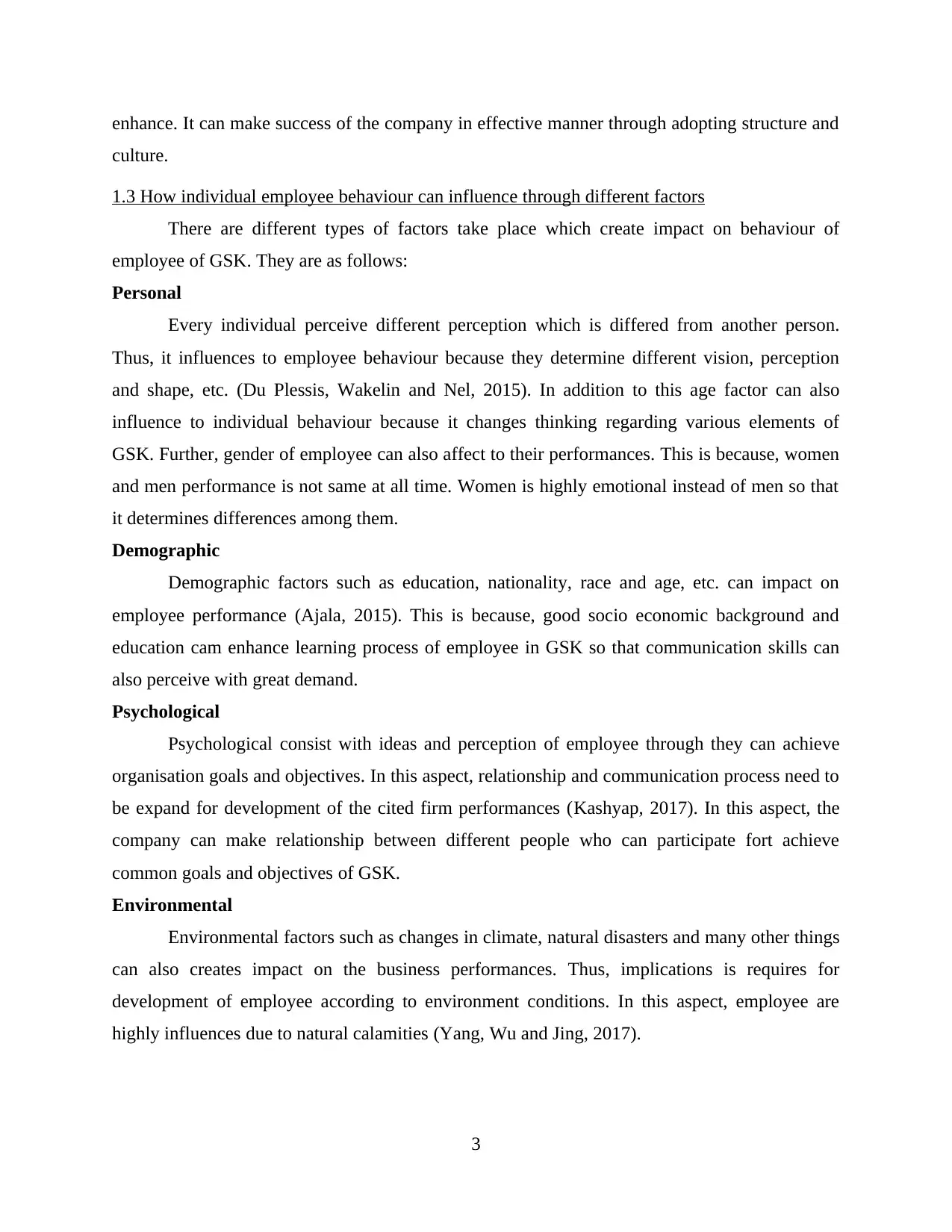
enhance. It can make success of the company in effective manner through adopting structure and
culture.
1.3 How individual employee behaviour can influence through different factors
There are different types of factors take place which create impact on behaviour of
employee of GSK. They are as follows:
Personal
Every individual perceive different perception which is differed from another person.
Thus, it influences to employee behaviour because they determine different vision, perception
and shape, etc. (Du Plessis, Wakelin and Nel, 2015). In addition to this age factor can also
influence to individual behaviour because it changes thinking regarding various elements of
GSK. Further, gender of employee can also affect to their performances. This is because, women
and men performance is not same at all time. Women is highly emotional instead of men so that
it determines differences among them.
Demographic
Demographic factors such as education, nationality, race and age, etc. can impact on
employee performance (Ajala, 2015). This is because, good socio economic background and
education cam enhance learning process of employee in GSK so that communication skills can
also perceive with great demand.
Psychological
Psychological consist with ideas and perception of employee through they can achieve
organisation goals and objectives. In this aspect, relationship and communication process need to
be expand for development of the cited firm performances (Kashyap, 2017). In this aspect, the
company can make relationship between different people who can participate fort achieve
common goals and objectives of GSK.
Environmental
Environmental factors such as changes in climate, natural disasters and many other things
can also creates impact on the business performances. Thus, implications is requires for
development of employee according to environment conditions. In this aspect, employee are
highly influences due to natural calamities (Yang, Wu and Jing, 2017).
3
culture.
1.3 How individual employee behaviour can influence through different factors
There are different types of factors take place which create impact on behaviour of
employee of GSK. They are as follows:
Personal
Every individual perceive different perception which is differed from another person.
Thus, it influences to employee behaviour because they determine different vision, perception
and shape, etc. (Du Plessis, Wakelin and Nel, 2015). In addition to this age factor can also
influence to individual behaviour because it changes thinking regarding various elements of
GSK. Further, gender of employee can also affect to their performances. This is because, women
and men performance is not same at all time. Women is highly emotional instead of men so that
it determines differences among them.
Demographic
Demographic factors such as education, nationality, race and age, etc. can impact on
employee performance (Ajala, 2015). This is because, good socio economic background and
education cam enhance learning process of employee in GSK so that communication skills can
also perceive with great demand.
Psychological
Psychological consist with ideas and perception of employee through they can achieve
organisation goals and objectives. In this aspect, relationship and communication process need to
be expand for development of the cited firm performances (Kashyap, 2017). In this aspect, the
company can make relationship between different people who can participate fort achieve
common goals and objectives of GSK.
Environmental
Environmental factors such as changes in climate, natural disasters and many other things
can also creates impact on the business performances. Thus, implications is requires for
development of employee according to environment conditions. In this aspect, employee are
highly influences due to natural calamities (Yang, Wu and Jing, 2017).
3
⊘ This is a preview!⊘
Do you want full access?
Subscribe today to unlock all pages.

Trusted by 1+ million students worldwide
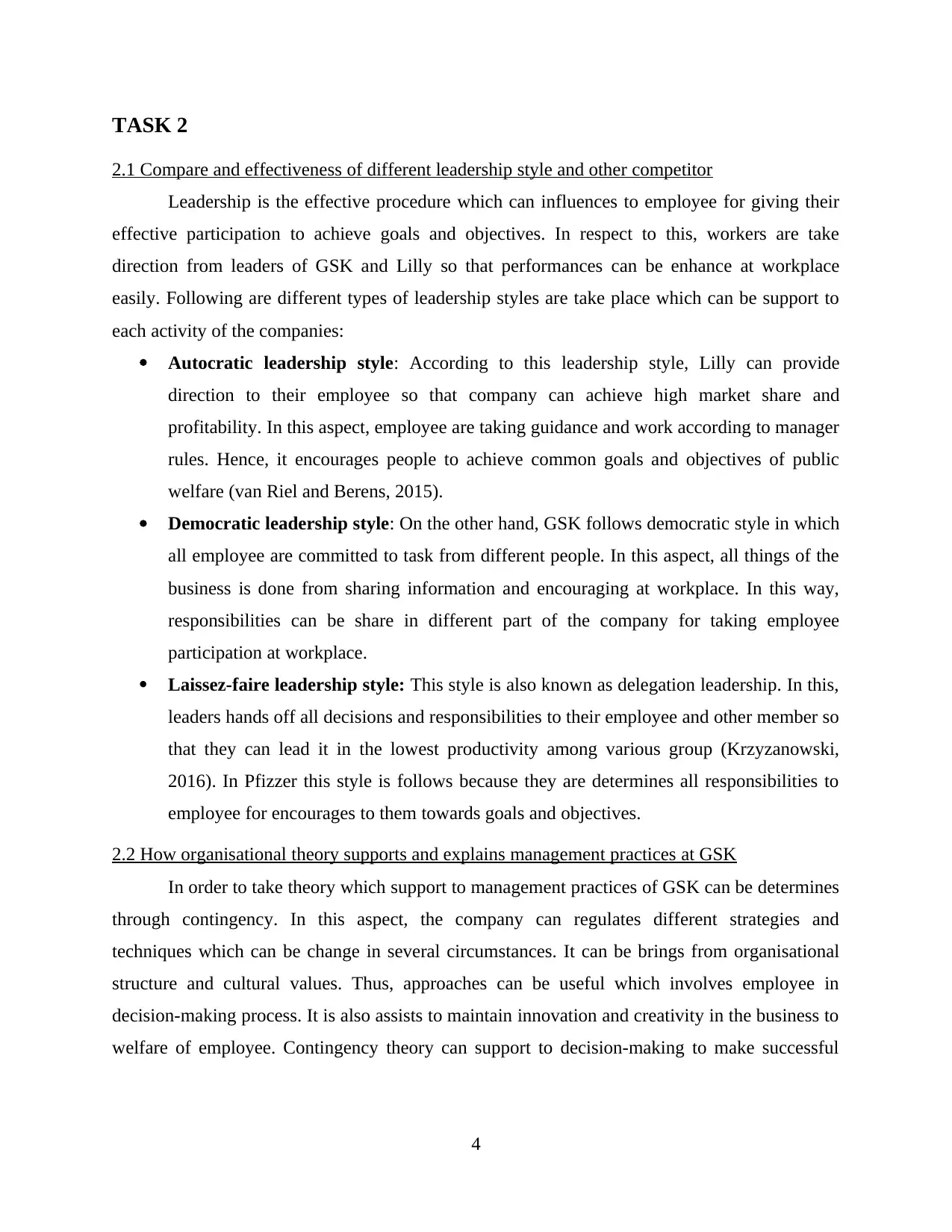
TASK 2
2.1 Compare and effectiveness of different leadership style and other competitor
Leadership is the effective procedure which can influences to employee for giving their
effective participation to achieve goals and objectives. In respect to this, workers are take
direction from leaders of GSK and Lilly so that performances can be enhance at workplace
easily. Following are different types of leadership styles are take place which can be support to
each activity of the companies:
Autocratic leadership style: According to this leadership style, Lilly can provide
direction to their employee so that company can achieve high market share and
profitability. In this aspect, employee are taking guidance and work according to manager
rules. Hence, it encourages people to achieve common goals and objectives of public
welfare (van Riel and Berens, 2015).
Democratic leadership style: On the other hand, GSK follows democratic style in which
all employee are committed to task from different people. In this aspect, all things of the
business is done from sharing information and encouraging at workplace. In this way,
responsibilities can be share in different part of the company for taking employee
participation at workplace.
Laissez-faire leadership style: This style is also known as delegation leadership. In this,
leaders hands off all decisions and responsibilities to their employee and other member so
that they can lead it in the lowest productivity among various group (Krzyzanowski,
2016). In Pfizzer this style is follows because they are determines all responsibilities to
employee for encourages to them towards goals and objectives.
2.2 How organisational theory supports and explains management practices at GSK
In order to take theory which support to management practices of GSK can be determines
through contingency. In this aspect, the company can regulates different strategies and
techniques which can be change in several circumstances. It can be brings from organisational
structure and cultural values. Thus, approaches can be useful which involves employee in
decision-making process. It is also assists to maintain innovation and creativity in the business to
welfare of employee. Contingency theory can support to decision-making to make successful
4
2.1 Compare and effectiveness of different leadership style and other competitor
Leadership is the effective procedure which can influences to employee for giving their
effective participation to achieve goals and objectives. In respect to this, workers are take
direction from leaders of GSK and Lilly so that performances can be enhance at workplace
easily. Following are different types of leadership styles are take place which can be support to
each activity of the companies:
Autocratic leadership style: According to this leadership style, Lilly can provide
direction to their employee so that company can achieve high market share and
profitability. In this aspect, employee are taking guidance and work according to manager
rules. Hence, it encourages people to achieve common goals and objectives of public
welfare (van Riel and Berens, 2015).
Democratic leadership style: On the other hand, GSK follows democratic style in which
all employee are committed to task from different people. In this aspect, all things of the
business is done from sharing information and encouraging at workplace. In this way,
responsibilities can be share in different part of the company for taking employee
participation at workplace.
Laissez-faire leadership style: This style is also known as delegation leadership. In this,
leaders hands off all decisions and responsibilities to their employee and other member so
that they can lead it in the lowest productivity among various group (Krzyzanowski,
2016). In Pfizzer this style is follows because they are determines all responsibilities to
employee for encourages to them towards goals and objectives.
2.2 How organisational theory supports and explains management practices at GSK
In order to take theory which support to management practices of GSK can be determines
through contingency. In this aspect, the company can regulates different strategies and
techniques which can be change in several circumstances. It can be brings from organisational
structure and cultural values. Thus, approaches can be useful which involves employee in
decision-making process. It is also assists to maintain innovation and creativity in the business to
welfare of employee. Contingency theory can support to decision-making to make successful
4
Paraphrase This Document
Need a fresh take? Get an instant paraphrase of this document with our AI Paraphraser
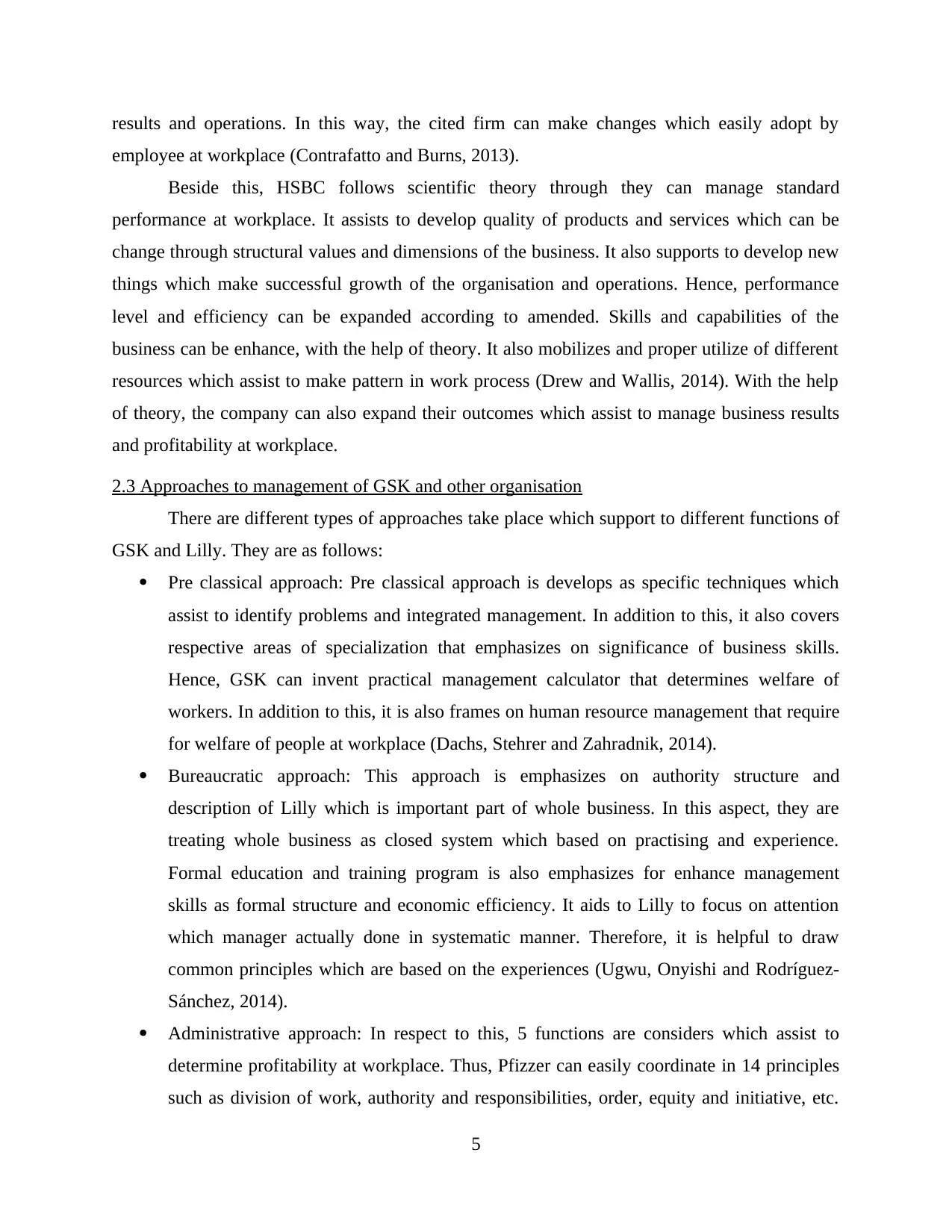
results and operations. In this way, the cited firm can make changes which easily adopt by
employee at workplace (Contrafatto and Burns, 2013).
Beside this, HSBC follows scientific theory through they can manage standard
performance at workplace. It assists to develop quality of products and services which can be
change through structural values and dimensions of the business. It also supports to develop new
things which make successful growth of the organisation and operations. Hence, performance
level and efficiency can be expanded according to amended. Skills and capabilities of the
business can be enhance, with the help of theory. It also mobilizes and proper utilize of different
resources which assist to make pattern in work process (Drew and Wallis, 2014). With the help
of theory, the company can also expand their outcomes which assist to manage business results
and profitability at workplace.
2.3 Approaches to management of GSK and other organisation
There are different types of approaches take place which support to different functions of
GSK and Lilly. They are as follows:
Pre classical approach: Pre classical approach is develops as specific techniques which
assist to identify problems and integrated management. In addition to this, it also covers
respective areas of specialization that emphasizes on significance of business skills.
Hence, GSK can invent practical management calculator that determines welfare of
workers. In addition to this, it is also frames on human resource management that require
for welfare of people at workplace (Dachs, Stehrer and Zahradnik, 2014).
Bureaucratic approach: This approach is emphasizes on authority structure and
description of Lilly which is important part of whole business. In this aspect, they are
treating whole business as closed system which based on practising and experience.
Formal education and training program is also emphasizes for enhance management
skills as formal structure and economic efficiency. It aids to Lilly to focus on attention
which manager actually done in systematic manner. Therefore, it is helpful to draw
common principles which are based on the experiences (Ugwu, Onyishi and Rodríguez-
Sánchez, 2014).
Administrative approach: In respect to this, 5 functions are considers which assist to
determine profitability at workplace. Thus, Pfizzer can easily coordinate in 14 principles
such as division of work, authority and responsibilities, order, equity and initiative, etc.
5
employee at workplace (Contrafatto and Burns, 2013).
Beside this, HSBC follows scientific theory through they can manage standard
performance at workplace. It assists to develop quality of products and services which can be
change through structural values and dimensions of the business. It also supports to develop new
things which make successful growth of the organisation and operations. Hence, performance
level and efficiency can be expanded according to amended. Skills and capabilities of the
business can be enhance, with the help of theory. It also mobilizes and proper utilize of different
resources which assist to make pattern in work process (Drew and Wallis, 2014). With the help
of theory, the company can also expand their outcomes which assist to manage business results
and profitability at workplace.
2.3 Approaches to management of GSK and other organisation
There are different types of approaches take place which support to different functions of
GSK and Lilly. They are as follows:
Pre classical approach: Pre classical approach is develops as specific techniques which
assist to identify problems and integrated management. In addition to this, it also covers
respective areas of specialization that emphasizes on significance of business skills.
Hence, GSK can invent practical management calculator that determines welfare of
workers. In addition to this, it is also frames on human resource management that require
for welfare of people at workplace (Dachs, Stehrer and Zahradnik, 2014).
Bureaucratic approach: This approach is emphasizes on authority structure and
description of Lilly which is important part of whole business. In this aspect, they are
treating whole business as closed system which based on practising and experience.
Formal education and training program is also emphasizes for enhance management
skills as formal structure and economic efficiency. It aids to Lilly to focus on attention
which manager actually done in systematic manner. Therefore, it is helpful to draw
common principles which are based on the experiences (Ugwu, Onyishi and Rodríguez-
Sánchez, 2014).
Administrative approach: In respect to this, 5 functions are considers which assist to
determine profitability at workplace. Thus, Pfizzer can easily coordinate in 14 principles
such as division of work, authority and responsibilities, order, equity and initiative, etc.
5
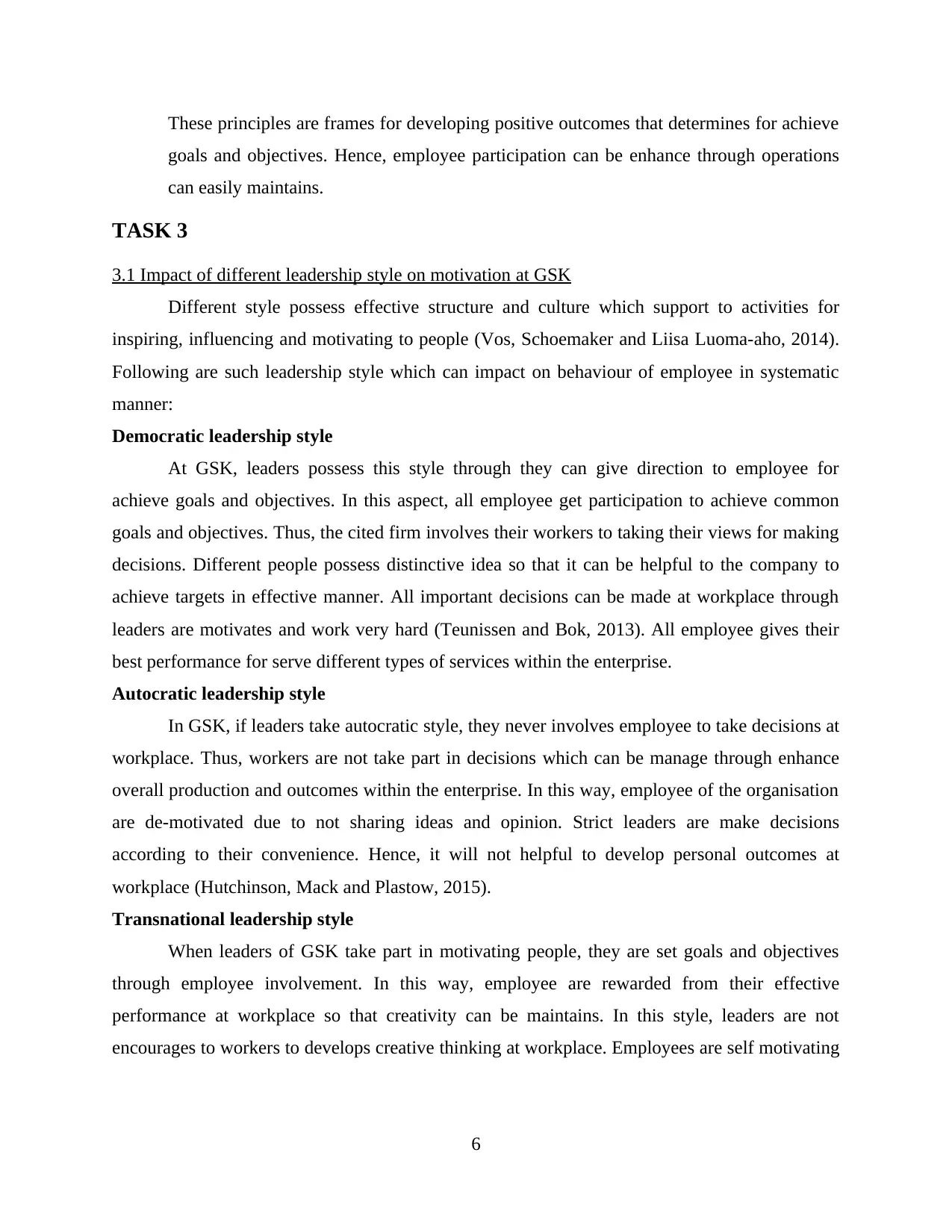
These principles are frames for developing positive outcomes that determines for achieve
goals and objectives. Hence, employee participation can be enhance through operations
can easily maintains.
TASK 3
3.1 Impact of different leadership style on motivation at GSK
Different style possess effective structure and culture which support to activities for
inspiring, influencing and motivating to people (Vos, Schoemaker and Liisa Luoma-aho, 2014).
Following are such leadership style which can impact on behaviour of employee in systematic
manner:
Democratic leadership style
At GSK, leaders possess this style through they can give direction to employee for
achieve goals and objectives. In this aspect, all employee get participation to achieve common
goals and objectives. Thus, the cited firm involves their workers to taking their views for making
decisions. Different people possess distinctive idea so that it can be helpful to the company to
achieve targets in effective manner. All important decisions can be made at workplace through
leaders are motivates and work very hard (Teunissen and Bok, 2013). All employee gives their
best performance for serve different types of services within the enterprise.
Autocratic leadership style
In GSK, if leaders take autocratic style, they never involves employee to take decisions at
workplace. Thus, workers are not take part in decisions which can be manage through enhance
overall production and outcomes within the enterprise. In this way, employee of the organisation
are de-motivated due to not sharing ideas and opinion. Strict leaders are make decisions
according to their convenience. Hence, it will not helpful to develop personal outcomes at
workplace (Hutchinson, Mack and Plastow, 2015).
Transnational leadership style
When leaders of GSK take part in motivating people, they are set goals and objectives
through employee involvement. In this way, employee are rewarded from their effective
performance at workplace so that creativity can be maintains. In this style, leaders are not
encourages to workers to develops creative thinking at workplace. Employees are self motivating
6
goals and objectives. Hence, employee participation can be enhance through operations
can easily maintains.
TASK 3
3.1 Impact of different leadership style on motivation at GSK
Different style possess effective structure and culture which support to activities for
inspiring, influencing and motivating to people (Vos, Schoemaker and Liisa Luoma-aho, 2014).
Following are such leadership style which can impact on behaviour of employee in systematic
manner:
Democratic leadership style
At GSK, leaders possess this style through they can give direction to employee for
achieve goals and objectives. In this aspect, all employee get participation to achieve common
goals and objectives. Thus, the cited firm involves their workers to taking their views for making
decisions. Different people possess distinctive idea so that it can be helpful to the company to
achieve targets in effective manner. All important decisions can be made at workplace through
leaders are motivates and work very hard (Teunissen and Bok, 2013). All employee gives their
best performance for serve different types of services within the enterprise.
Autocratic leadership style
In GSK, if leaders take autocratic style, they never involves employee to take decisions at
workplace. Thus, workers are not take part in decisions which can be manage through enhance
overall production and outcomes within the enterprise. In this way, employee of the organisation
are de-motivated due to not sharing ideas and opinion. Strict leaders are make decisions
according to their convenience. Hence, it will not helpful to develop personal outcomes at
workplace (Hutchinson, Mack and Plastow, 2015).
Transnational leadership style
When leaders of GSK take part in motivating people, they are set goals and objectives
through employee involvement. In this way, employee are rewarded from their effective
performance at workplace so that creativity can be maintains. In this style, leaders are not
encourages to workers to develops creative thinking at workplace. Employees are self motivating
6
⊘ This is a preview!⊘
Do you want full access?
Subscribe today to unlock all pages.

Trusted by 1+ million students worldwide
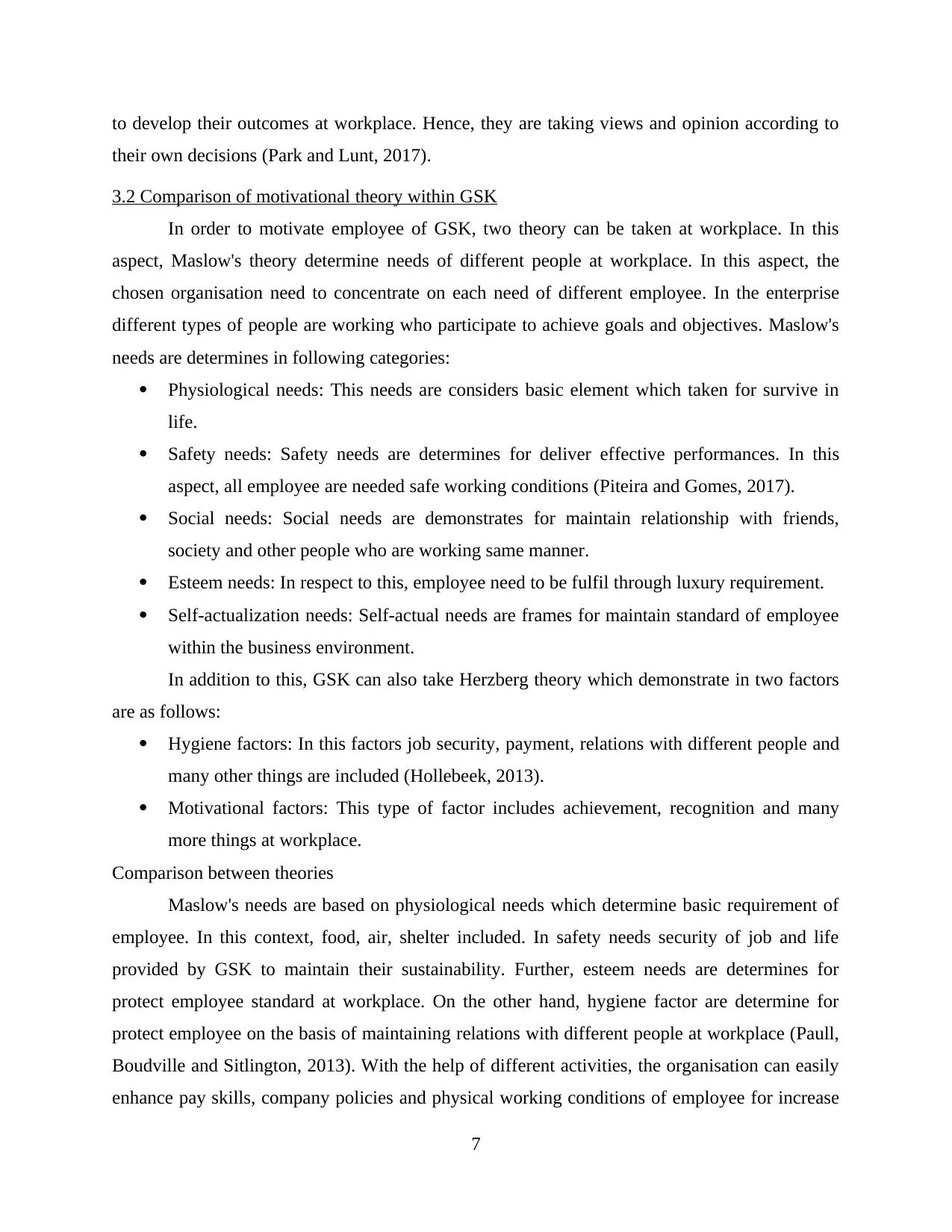
to develop their outcomes at workplace. Hence, they are taking views and opinion according to
their own decisions (Park and Lunt, 2017).
3.2 Comparison of motivational theory within GSK
In order to motivate employee of GSK, two theory can be taken at workplace. In this
aspect, Maslow's theory determine needs of different people at workplace. In this aspect, the
chosen organisation need to concentrate on each need of different employee. In the enterprise
different types of people are working who participate to achieve goals and objectives. Maslow's
needs are determines in following categories:
Physiological needs: This needs are considers basic element which taken for survive in
life.
Safety needs: Safety needs are determines for deliver effective performances. In this
aspect, all employee are needed safe working conditions (Piteira and Gomes, 2017).
Social needs: Social needs are demonstrates for maintain relationship with friends,
society and other people who are working same manner.
Esteem needs: In respect to this, employee need to be fulfil through luxury requirement.
Self-actualization needs: Self-actual needs are frames for maintain standard of employee
within the business environment.
In addition to this, GSK can also take Herzberg theory which demonstrate in two factors
are as follows:
Hygiene factors: In this factors job security, payment, relations with different people and
many other things are included (Hollebeek, 2013).
Motivational factors: This type of factor includes achievement, recognition and many
more things at workplace.
Comparison between theories
Maslow's needs are based on physiological needs which determine basic requirement of
employee. In this context, food, air, shelter included. In safety needs security of job and life
provided by GSK to maintain their sustainability. Further, esteem needs are determines for
protect employee standard at workplace. On the other hand, hygiene factor are determine for
protect employee on the basis of maintaining relations with different people at workplace (Paull,
Boudville and Sitlington, 2013). With the help of different activities, the organisation can easily
enhance pay skills, company policies and physical working conditions of employee for increase
7
their own decisions (Park and Lunt, 2017).
3.2 Comparison of motivational theory within GSK
In order to motivate employee of GSK, two theory can be taken at workplace. In this
aspect, Maslow's theory determine needs of different people at workplace. In this aspect, the
chosen organisation need to concentrate on each need of different employee. In the enterprise
different types of people are working who participate to achieve goals and objectives. Maslow's
needs are determines in following categories:
Physiological needs: This needs are considers basic element which taken for survive in
life.
Safety needs: Safety needs are determines for deliver effective performances. In this
aspect, all employee are needed safe working conditions (Piteira and Gomes, 2017).
Social needs: Social needs are demonstrates for maintain relationship with friends,
society and other people who are working same manner.
Esteem needs: In respect to this, employee need to be fulfil through luxury requirement.
Self-actualization needs: Self-actual needs are frames for maintain standard of employee
within the business environment.
In addition to this, GSK can also take Herzberg theory which demonstrate in two factors
are as follows:
Hygiene factors: In this factors job security, payment, relations with different people and
many other things are included (Hollebeek, 2013).
Motivational factors: This type of factor includes achievement, recognition and many
more things at workplace.
Comparison between theories
Maslow's needs are based on physiological needs which determine basic requirement of
employee. In this context, food, air, shelter included. In safety needs security of job and life
provided by GSK to maintain their sustainability. Further, esteem needs are determines for
protect employee standard at workplace. On the other hand, hygiene factor are determine for
protect employee on the basis of maintaining relations with different people at workplace (Paull,
Boudville and Sitlington, 2013). With the help of different activities, the organisation can easily
enhance pay skills, company policies and physical working conditions of employee for increase
7
Paraphrase This Document
Need a fresh take? Get an instant paraphrase of this document with our AI Paraphraser
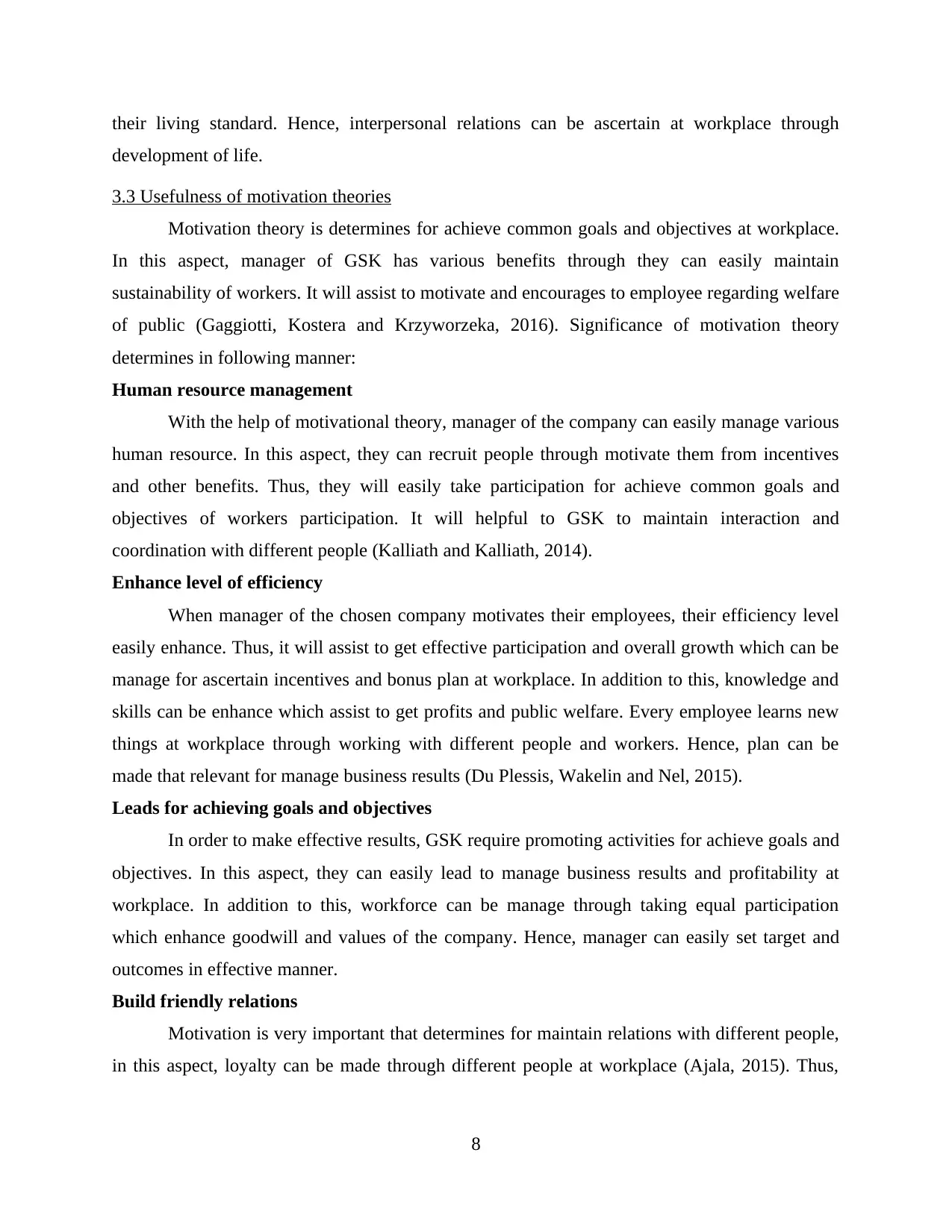
their living standard. Hence, interpersonal relations can be ascertain at workplace through
development of life.
3.3 Usefulness of motivation theories
Motivation theory is determines for achieve common goals and objectives at workplace.
In this aspect, manager of GSK has various benefits through they can easily maintain
sustainability of workers. It will assist to motivate and encourages to employee regarding welfare
of public (Gaggiotti, Kostera and Krzyworzeka, 2016). Significance of motivation theory
determines in following manner:
Human resource management
With the help of motivational theory, manager of the company can easily manage various
human resource. In this aspect, they can recruit people through motivate them from incentives
and other benefits. Thus, they will easily take participation for achieve common goals and
objectives of workers participation. It will helpful to GSK to maintain interaction and
coordination with different people (Kalliath and Kalliath, 2014).
Enhance level of efficiency
When manager of the chosen company motivates their employees, their efficiency level
easily enhance. Thus, it will assist to get effective participation and overall growth which can be
manage for ascertain incentives and bonus plan at workplace. In addition to this, knowledge and
skills can be enhance which assist to get profits and public welfare. Every employee learns new
things at workplace through working with different people and workers. Hence, plan can be
made that relevant for manage business results (Du Plessis, Wakelin and Nel, 2015).
Leads for achieving goals and objectives
In order to make effective results, GSK require promoting activities for achieve goals and
objectives. In this aspect, they can easily lead to manage business results and profitability at
workplace. In addition to this, workforce can be manage through taking equal participation
which enhance goodwill and values of the company. Hence, manager can easily set target and
outcomes in effective manner.
Build friendly relations
Motivation is very important that determines for maintain relations with different people,
in this aspect, loyalty can be made through different people at workplace (Ajala, 2015). Thus,
8
development of life.
3.3 Usefulness of motivation theories
Motivation theory is determines for achieve common goals and objectives at workplace.
In this aspect, manager of GSK has various benefits through they can easily maintain
sustainability of workers. It will assist to motivate and encourages to employee regarding welfare
of public (Gaggiotti, Kostera and Krzyworzeka, 2016). Significance of motivation theory
determines in following manner:
Human resource management
With the help of motivational theory, manager of the company can easily manage various
human resource. In this aspect, they can recruit people through motivate them from incentives
and other benefits. Thus, they will easily take participation for achieve common goals and
objectives of workers participation. It will helpful to GSK to maintain interaction and
coordination with different people (Kalliath and Kalliath, 2014).
Enhance level of efficiency
When manager of the chosen company motivates their employees, their efficiency level
easily enhance. Thus, it will assist to get effective participation and overall growth which can be
manage for ascertain incentives and bonus plan at workplace. In addition to this, knowledge and
skills can be enhance which assist to get profits and public welfare. Every employee learns new
things at workplace through working with different people and workers. Hence, plan can be
made that relevant for manage business results (Du Plessis, Wakelin and Nel, 2015).
Leads for achieving goals and objectives
In order to make effective results, GSK require promoting activities for achieve goals and
objectives. In this aspect, they can easily lead to manage business results and profitability at
workplace. In addition to this, workforce can be manage through taking equal participation
which enhance goodwill and values of the company. Hence, manager can easily set target and
outcomes in effective manner.
Build friendly relations
Motivation is very important that determines for maintain relations with different people,
in this aspect, loyalty can be made through different people at workplace (Ajala, 2015). Thus,
8
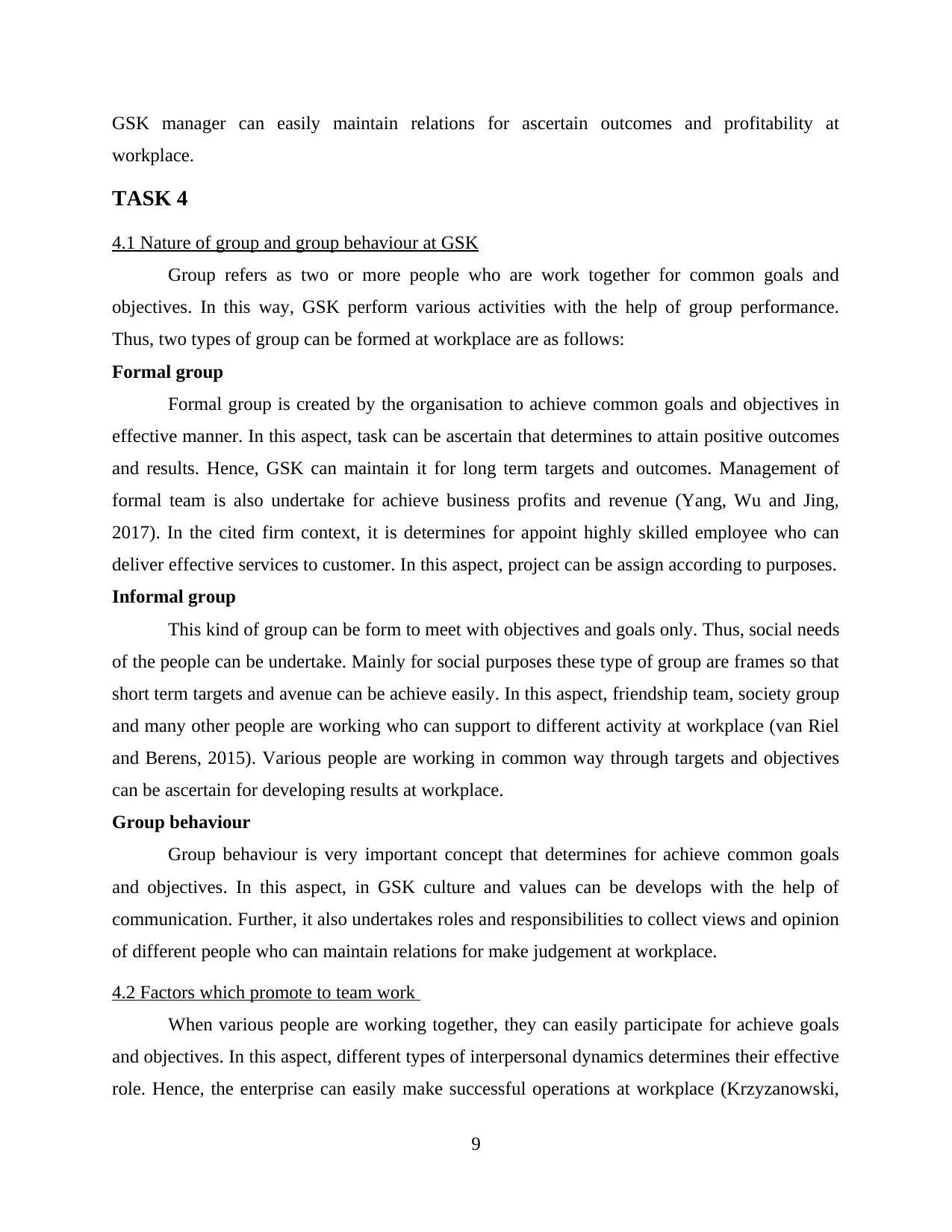
GSK manager can easily maintain relations for ascertain outcomes and profitability at
workplace.
TASK 4
4.1 Nature of group and group behaviour at GSK
Group refers as two or more people who are work together for common goals and
objectives. In this way, GSK perform various activities with the help of group performance.
Thus, two types of group can be formed at workplace are as follows:
Formal group
Formal group is created by the organisation to achieve common goals and objectives in
effective manner. In this aspect, task can be ascertain that determines to attain positive outcomes
and results. Hence, GSK can maintain it for long term targets and outcomes. Management of
formal team is also undertake for achieve business profits and revenue (Yang, Wu and Jing,
2017). In the cited firm context, it is determines for appoint highly skilled employee who can
deliver effective services to customer. In this aspect, project can be assign according to purposes.
Informal group
This kind of group can be form to meet with objectives and goals only. Thus, social needs
of the people can be undertake. Mainly for social purposes these type of group are frames so that
short term targets and avenue can be achieve easily. In this aspect, friendship team, society group
and many other people are working who can support to different activity at workplace (van Riel
and Berens, 2015). Various people are working in common way through targets and objectives
can be ascertain for developing results at workplace.
Group behaviour
Group behaviour is very important concept that determines for achieve common goals
and objectives. In this aspect, in GSK culture and values can be develops with the help of
communication. Further, it also undertakes roles and responsibilities to collect views and opinion
of different people who can maintain relations for make judgement at workplace.
4.2 Factors which promote to team work
When various people are working together, they can easily participate for achieve goals
and objectives. In this aspect, different types of interpersonal dynamics determines their effective
role. Hence, the enterprise can easily make successful operations at workplace (Krzyzanowski,
9
workplace.
TASK 4
4.1 Nature of group and group behaviour at GSK
Group refers as two or more people who are work together for common goals and
objectives. In this way, GSK perform various activities with the help of group performance.
Thus, two types of group can be formed at workplace are as follows:
Formal group
Formal group is created by the organisation to achieve common goals and objectives in
effective manner. In this aspect, task can be ascertain that determines to attain positive outcomes
and results. Hence, GSK can maintain it for long term targets and outcomes. Management of
formal team is also undertake for achieve business profits and revenue (Yang, Wu and Jing,
2017). In the cited firm context, it is determines for appoint highly skilled employee who can
deliver effective services to customer. In this aspect, project can be assign according to purposes.
Informal group
This kind of group can be form to meet with objectives and goals only. Thus, social needs
of the people can be undertake. Mainly for social purposes these type of group are frames so that
short term targets and avenue can be achieve easily. In this aspect, friendship team, society group
and many other people are working who can support to different activity at workplace (van Riel
and Berens, 2015). Various people are working in common way through targets and objectives
can be ascertain for developing results at workplace.
Group behaviour
Group behaviour is very important concept that determines for achieve common goals
and objectives. In this aspect, in GSK culture and values can be develops with the help of
communication. Further, it also undertakes roles and responsibilities to collect views and opinion
of different people who can maintain relations for make judgement at workplace.
4.2 Factors which promote to team work
When various people are working together, they can easily participate for achieve goals
and objectives. In this aspect, different types of interpersonal dynamics determines their effective
role. Hence, the enterprise can easily make successful operations at workplace (Krzyzanowski,
9
⊘ This is a preview!⊘
Do you want full access?
Subscribe today to unlock all pages.

Trusted by 1+ million students worldwide
1 out of 16
Related Documents
Your All-in-One AI-Powered Toolkit for Academic Success.
+13062052269
info@desklib.com
Available 24*7 on WhatsApp / Email
![[object Object]](/_next/static/media/star-bottom.7253800d.svg)
Unlock your academic potential
Copyright © 2020–2025 A2Z Services. All Rights Reserved. Developed and managed by ZUCOL.





